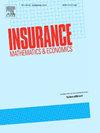HARA效用下随机市场随机现金流下的稳健资产负债管理博弈
IF 2.2
2区 经济学
Q2 ECONOMICS
引用次数: 0
摘要
本文研究了一个以随机波动率和随机利率为特征的多元随机协方差模型下,两个具有模糊性规避的战略交互管理者的最优资产负债管理问题。两个规避歧义的经理参与一个由货币市场账户、市场指数、股票和零息债券组成的金融市场,以提高利润,其中利率是通过仿射模型确定的,该模型包括Cox-Ingersoll-Ross模型和Vasicek模型作为具体实例,而市场指数和股票价格是由一类非马尔可夫多元随机协方差模型驱动的。此外,两名竞争经理人在投资决策中受到特殊的负债承诺和现金流入或流出随机性的影响,具有不同的绝对风险厌恶(HARA)效用函数所描述的风险偏好,其中幂效用函数是一个特例。每个经理的目标都是制定一个稳健的投资策略,通过在最坏情况下最大化相对盈余的预期终端效用,从而超越竞争对手。利用后向随机微分方程方法结合鞅最优性原理求解该鲁棒非马尔可夫随机微分对策,得到鲁棒纳什均衡投资策略的封闭表达式、最坏概率测度下的密度生成器过程以及相应的值函数。最后,提供了数值例子来说明其财务影响。本文章由计算机程序翻译,如有差异,请以英文原文为准。
Robust asset-liability management games in a stochastic market with stochastic cash flows under HARA utility
This paper investigates an optimal asset-liability management problem involving two strategically interactive managers with ambiguity aversion under a multivariate stochastic covariance model characterized by hybrid stochastic volatility and stochastic interest rates. Two ambiguity-averse managers participate in a financial market comprising a money market account, a market index, a stock, and zero-coupon bonds to enhance profits, where interest rates are determined via an affine model, which includes both the Cox–Ingersoll–Ross model and the Vasicek model as specific instances, while the market index and stock price are driven by a general class of non-Markovian multivariate stochastic covariance models. Moreover, the two competitive managers, subject to idiosyncratic liability commitments and influenced by the random nature of cash inflow or outflow in their investment decision making, have varying risk preferences described by the hyperbolic absolute risk aversion (HARA) utility function, with the power utility function as a special case. Each manager aims to develop a robust investment strategy to outperform their competitors by maximizing the expected terminal utility of the relative surplus in worst-case scenarios. A backward stochastic differential equation method coupled with the martingale optimality principle is used to solve this robust non-Markovian stochastic differential game, resulting in closed-form expressions for robust Nash equilibrium investment strategies, the density generator processes under worst-case probability measures, and the corresponding value functions. Finally, numerical examples are provided to illustrate their financial implications.
求助全文
通过发布文献求助,成功后即可免费获取论文全文。
去求助
来源期刊

Insurance Mathematics & Economics
管理科学-数学跨学科应用
CiteScore
3.40
自引率
15.80%
发文量
90
审稿时长
17.3 weeks
期刊介绍:
Insurance: Mathematics and Economics publishes leading research spanning all fields of actuarial science research. It appears six times per year and is the largest journal in actuarial science research around the world.
Insurance: Mathematics and Economics is an international academic journal that aims to strengthen the communication between individuals and groups who develop and apply research results in actuarial science. The journal feels a particular obligation to facilitate closer cooperation between those who conduct research in insurance mathematics and quantitative insurance economics, and practicing actuaries who are interested in the implementation of the results. To this purpose, Insurance: Mathematics and Economics publishes high-quality articles of broad international interest, concerned with either the theory of insurance mathematics and quantitative insurance economics or the inventive application of it, including empirical or experimental results. Articles that combine several of these aspects are particularly considered.
 求助内容:
求助内容: 应助结果提醒方式:
应助结果提醒方式:


